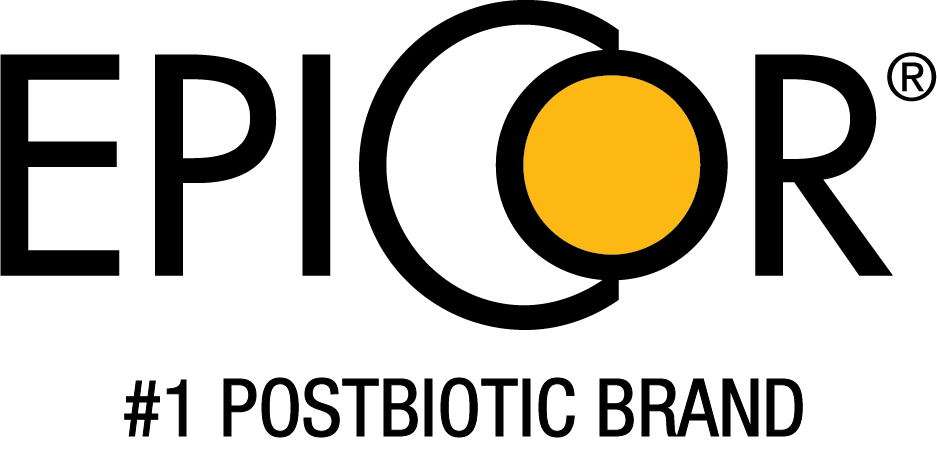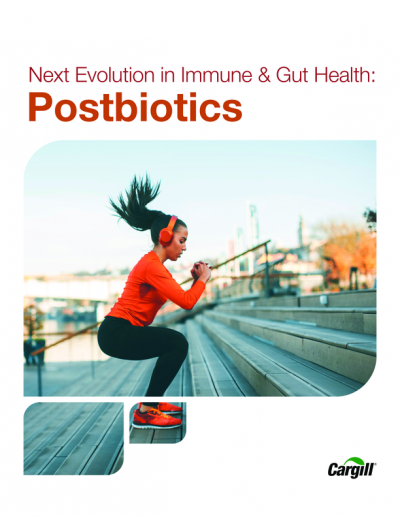Promotional Features
Leveraging the Power of Postbiotics
Meeting consumer needs through clinical research while offering the formulation flexibility required by food and beverage manufacturers - postbiotics are well-positioned for growth.
Immune support through the gut
While consumers are looking for ways to give their immune system additional support, emerging science suggests one of the best ways to kickstart immunity may be through the gut. The gut is home to more than 70% of our immune cells. But unlike the cells in the rest of the body, which are nourished via the blood, immune cells in the gut can be fed by the beneficial bacteria that reside there.
Research suggests that some nutrients in foods or supplements do not need to be absorbed in the upper gastrointestinal tract. Instead, these nutrients can provide energy directly to the cells of the gut lining, including the immune cells that call it home. The impact this causes on the gut microbiota can have effects on the body’s overall immune response and digestive health.
Initial findings have shown us that we can impact the microbiota by adding to it with probiotics or modulating it with prebiotics. Now, evidence suggests that “dead” microbes – such as those in postbiotics – may generate many of the same health benefits.
Pre-, pro-, and postbiotics
To first know postbiotics, we must understand pro- and prebiotics. Probiotics are perhaps the best known of the -biotic family. These are beneficial bacteria that must remain alive through formulation, manufacturing, and packaging until they reach the consumer’s gut. Prebiotics are often thought of as the food for a probiotic helping to stimulate growth of healthy bacteria in the gut. While both -biotics serve to support the microbiome, there are limitations in the formulation and the stability of each.
Postbiotics, on the other hand, are produced through fermentation outside the body, under highly controlled conditions. This process creates a unique, non-living product.
Fermentation to finished goods
While there are similarities among the biotic family, postbiotics differentiate themselves from all the way from fermentation to finished good.
Postbiotics are derived from fermentation of bacteria or yeast. Throughout the fermentation process nothing is filtered out; the postbiotics are a preparation of inanimate microorganisms and their components. This means that postbiotics are comprised of dead microbes, amino acids, vitamins, short chain fatty acids, and additional components.
An illustration of how postbiotic ingredients are made can be shown through Cargill’s EpiCor® postbiotic. Made using baker’s yeast (Saccharomyces cerevisiae), EpiCor is derived through a natural fermentation process, it is gently dried using a proprietary heating process that kills off the yeast, while still preserving all the metabolites and functional compounds. The unique fingerprint of metabolites is the first point of differentiation.
Another feature that sets a postbiotic apart is the flexibility it offers in the formulation and manufacturing of finished goods. When considering formulation, of a functional food, beverage or supplement, a key differentiating factor is that postbiotics are inanimate. They can be formulated into a multitude of applications without fear of ‘killing them’ or hindering effectiveness when paired with other ingredients.
Following formulation, one must consider the impact of manufacturing. Many immune-supporting ingredients cannot survive the rigors of modern processing. Thankfully, the stability of a postbiotic can withstand baking, extruding, pasteurizing, stamping, squishing, soaking – you get the idea. It’s inanimate nature and robust build sets postbiotics up for success at each step.
Inanimate, not inactive
It is important to differentiate between inanimate and inactive. While postbiotics are inanimate, or nonliving, that is not indicative of their ability to actively impact the microbiota and provide a health benefit.
The microbiota can be impacted by adding probiotics, modulating with prebiotics, or through the direct support of postbiotics. EpiCor, for example, is rich with metabolites that support beneficial bacteria and have been found, through multiple human clinical trials, to provide a health benefit.
EpiCor has been shown to support the gut microbiome1, immune health2,3, and nasal comfort4. The research supporting this ingredient includes two randomized, double-blind, placebo-controlled human trials focused on immune support. More specifically, these trials evaluated the effect of EpiCor on the incidence and duration of cold and flu symptoms. One study included participants that had received vaccination for that year’s flu; the second study focused on non-flu vaccinated adults. In each of the 12-week trials it was found that participants who received EpiCor had statistically fewer incidents of cold and flu symptoms as compared to the placebo.2,3
Looking forward
The past few years have been monumental for postbiotics as they’ve gained significant consumer traction and witnessed a surge of clinical research. As consumers look for ways to better support their health and immunity, they may have just found it with postbiotics.
A 2022 global survey conducted by HealthFocus International noted that 25 percent of U.S. consumers currently consume functional foods and drinks to support immunity, and the Council for Responsible Nutrition says immunity is second only to general health benefits as a reason for supplement use.
While there is still much to learn about the gut-immune connection, many companies are doing their part to research the effectiveness of postbiotics. Cargill is among that list – funding clinical trials to show the effectiveness of EpiCor postbiotic. By leveraging research, we can continue to provide answers to the most pressing questions about postbiotics.
While still new, the science-backed benefits of this pH, heat, and shelf stable ingredient indicate a clear path forward. Delivering the beneficial properties consumers want, and the formulation flexibility food and beverage brands need, postbiotics are well-positioned for steady growth.
----
Resources:
[1] Pinheiro, I., et al. (2017). A yeast fermentate improves gastrointestinal discomfort and constipation by modulation of the gut microbiome: results from a randomized double-blind placebo-controlled pilot trial BMC Complement Altern Med 17, 441.
[2] Moyad MA, et al. Effects of a modified yeast supplement on cold/flu symptoms. Urol Nurs 2008, 28(1):50-55.
[3] Moyad MA, et al. Immunogenic yeast-based fermentate for cold/flu-like symptoms in nonvaccinated individuals. J Altern Complement Med 2010, 16(2):213-218.
[4] Moyad MA, et al. Immunogenic yeast-based fermentation product reduces allergic rhinitis-induces nasal congestion: a randomized, double-blind placebo-controlled trial. Adv Ther 2009, 26(8):795-804.


